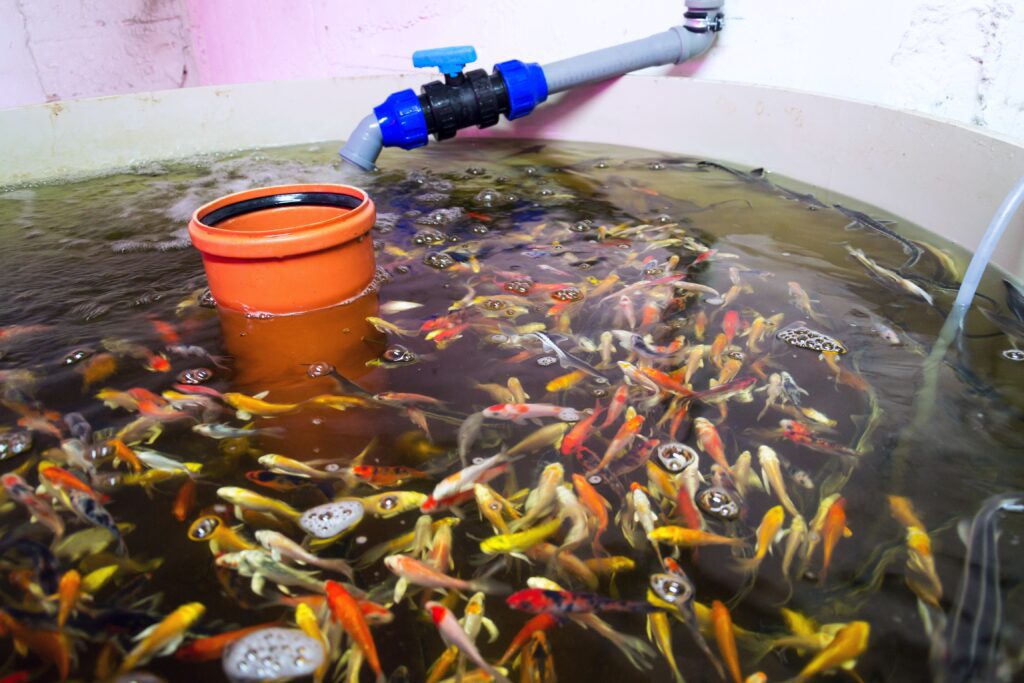Biofloc fish farming leverages the BFT or Biofloc Technology to farm fish in tanks under a carefully controlled environment. The fact that the environment is regularly monitored enhances the yield quality and quantity, ultimately increasing the profitability and sustainability of the fish farming business. A 2 m2 tank can hold up to 3000 fish, which is a superb cost-to-benefit metric, making BFT fish farming a favorite among new agripreneurs and fish farmers.
In India, the biofloc fish farming industry is a relatively newer but quickly growing industry. This implies immense market potential and space for new entrepreneurs to set up their own biofloc fish farms and earn huge profits from their business. Most notably, agripreneurs are gravitating towards learning biofloc fish farming because of the cyclical sustainability model that BFT works on – the waste excreted by the fish gets transformed into nutrients and minerals through BFT, and the fish thrive in the nutrient-rich culture which is kept fresh and healthy with little manual intervention.
Sounds interesting? You can find offline courses that are run by the fisheries’ departments and other government organizations, however, if you are interested in learning biofloc fish farming online, read on.
Online Courses facilitated by Industry Experts
With growing attention towards developing India’s MSME sector, there has been a keen focus on agribusinesses and some organizations have started working towards training aspiring entrepreneurs in business ideas around mushroom farming, dairy farming, and even biofloc fish farming. Some of these courses come with many benefits at extremely affordable rates.
For instance, Rocket Skills’ nominally priced Biofloc Fish Farming course is a 6-week long immersive experience which is a healthy mix of pre-recorded demonstration and theoretical videos which are self-paced and easy to follow. Besides the actual content of the course, the students are provided access to informative webinars that cover the industry know-how, tips and tricks of the trade and much more.
The most special feature of Rocket Skills’ online courses is the Q&A sessions which are held regularly with the trainer, wherein you can ask the trainer to resolve your queries on video chat. Additionally, if you need more face time with the trainer, you can even request hand-holding and set-up support from the team.
All the students are placed in manageably-sized batches and are provided with the video content of the course which can be accessed from anywhere, and at any time throughout the lifetime of the learner. The students are also added to a group chat with the trainer, and this group chat serves as a powerful resource due to rich peer-to-peer interactions and query resolution by the trainer and the team.
How-to guides
If you do a quick search on your favorite search engine, you’ll be able to find how-to guides in step-by-step format or even detailed research papers that will give you a broad understanding of how BFT works and what basic infrastructure you’d need to start your own farm. The obvious pros here include the fact that this method of acquiring knowledge is potentially free, it gives flexibility to the learner to guide the learning process as per her/his availability and bandwidth, and budget.
The cons on the other hand may outweigh the pros if you wish to start your BFT fish farming business, as this method is more beneficial and fine-tunes for learners who want to understand the Biofloc technology for hobby, research, or theoretical knowledge. There is nobody whom you can ask questions or discuss inhibitions, nor is it easy to hold writers of these guides accountable for any misinformation that may cost you actual money or drive your business into losses.
However, it is definitely a good idea to access these guides and resources in addition to any other method of acquiring knowledge – for instance, if you’re attending offline on-site training at an operational biofloc fish farm, you may want to read as much as you can about it in addition to the practical training, in order to get a 360-degree understanding of the process.
Open-source content (i.e., YouTube, Facebook, etc.)
YouTube is one of the biggest search engines in the world, which provides aspiring learners with a vast pool of knowledge (or should we say ‘tank’?). The highly specialized creators have taken this free-source platform to share all the knowledge they have, in order to gain a genuine and targeted following and the high competition ensures that the creators deliver high-quality content to be seen and recognized widely.
While there are numerous pros to this method of acquiring knowledge, the boons sometimes become banes. For instance, while there are thousands and thousands of videos that deliver high-value knowledge, it becomes extremely difficult to find a handful of those videos that’ll truly check all the boxes and deliver the knowledge that fits your situation and context. We live in the day and age of content dump, and specific knowledge is highly prized.
Another con could be the unfeasibility at the end of the creators of these videos to cater to each and every learner’s specific queries. Whether or not your questions would be resolved becomes a game of chance and it’s not very wise to gamble on the learning process, is it?
While any skill takes time, patience, and persistence to master, we understand that a good start definitely makes an unbeatable impact on the learning curve and so, based on all the pros and cons, we believe that a guided online course by an industry expert is your best bet. You can even interact with the facilitator and have your questions answered in real-time, which is something of such immense value that open-source content and how-to guides can just not beat it. We wish you all the best and hope that your agri-preneurship journey is a fruitful and profitable one!



